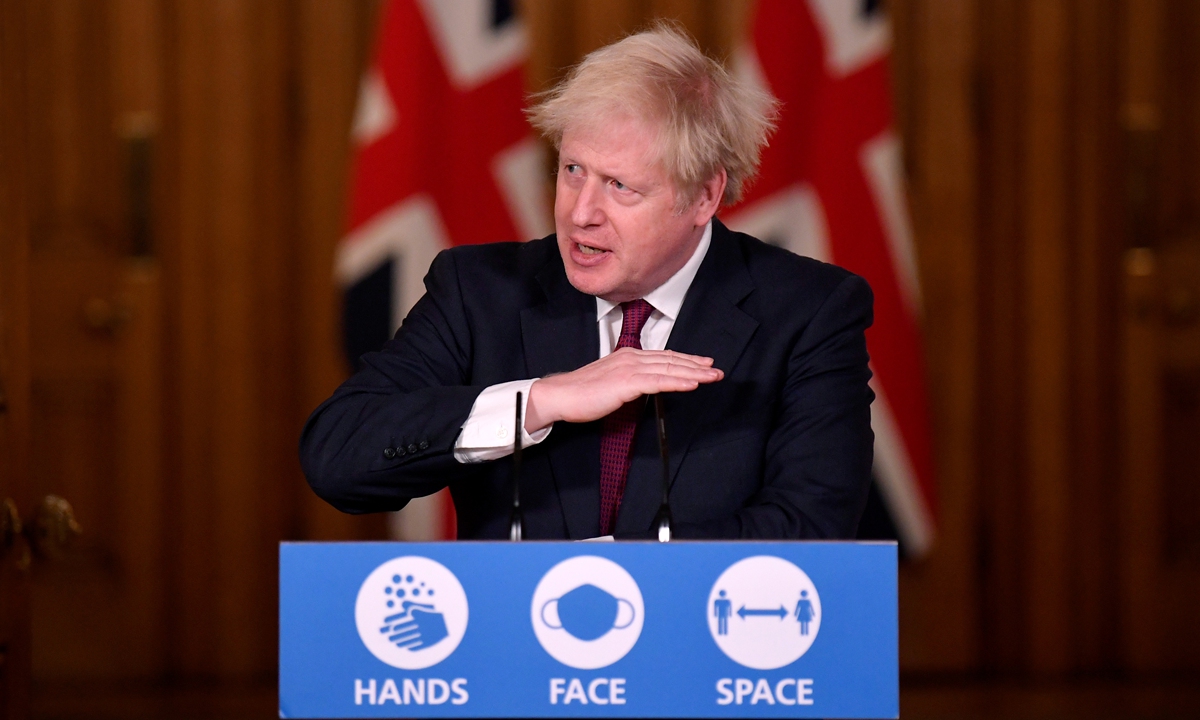UK’s Boris Johnson avoids big aid cuts
PM escapes embarrassing standoff with parliament over budget abroad

British Prime Minister Boris Johnson has approved placing more parts of the country into the highest level of restrictions, known as tier 4, on December 19. Photo: VCG
British Prime Minister Boris Johnson's government on Monday avoided a potentially embarrassing rebellion over cuts to the overseas aid budget, just days before the UK hosts the G7 summit.Johnson's government has faced bitter opposition from its own ranks over the breaking of a manifesto promise and slashing aid by billions of pounds in 2021 to protect public finances damaged by the pandemic.
But the prime minister was spared his first possible parliamentary defeat since a 2019 landslide election victory on the basis of a technicality.
Speaker Lindsay Hoyle told parliament the rebel amendment forcing the government to make up the shortfall on overseas aid elsewhere fell "outside the scope of the bill."
However, he hit out at the government for stalling a vote on the decision to no longer meet a legally enshrined commitment to spend 0.7 percent of gross national income (GNI) on aid.
"The government should find a way to have this important matter debated and to allow the house formally to take an effective decision," the speaker said, adding he would allow a debate on the issue on Tuesday.
Conservative lawmaker Andrew Mitchell, a former international development secretary who spearheaded the rebellion, said the government was treating MPs "with disrespect" and potentially "acting unlawfully."
"In the week of the British chairmanship of the G7, the government's failure to address this issue will indisputably mean hundreds of thousands of avoidable deaths will result," Mitchell said.
"It is already attracting criticism from all around the other members of the G7."
Mitchell said he had believed he could have overturned the ruling party's 80-seat majority by at least nine votes.
Conservative figures including former prime minister Theresa May have denounced the changes to aid, arguing the cut to 0.5 percent of GNI would leave Britain as the only member of the G7 nations not meeting the 0.7 percent target.
The debate has been unwelcome for Johnson before this weekend's leaders summit in Cornwall, southwest England, but he has said the cuts are needed due to pandemic expenditure.
Britain paid out around £15 billion ($20 billion) in overseas aid in 2020 before the cut of around £4.5 billion was implemented.
Meanwhile emergency pandemic support measures have sent UK annual borrowing rocketing to the equivalent to 14.5 percent of gross domestic product (GDP) - the highest level since World War II.
The government has said it will return to 0.7 percent of national income - a broader measure than GDP - "when the fiscal situation allows."
But the critics, who fear the cut could become permanent, argue its impact is too severe to institute even temporarily.
Every surviving former prime minister - from May to David Cameron, Gordon Brown, Tony Blair and John Major - opposes the cut.
AFP
